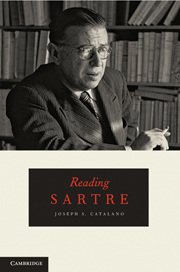Book contents
- Frontmatter
- Contents
- Preface
- Acknowledgments
- Works Frequently Cited
- PART ONE A RETROSPECTIVE OVERVIEW
- 2 Saint Genet: Actor and Martyr
- 3 The Critique of Dialectical Reason
- 4 Being and Nothingness
- PART TWO THE WORKS THEMSELVES
- 5 Being and Nothingness
- 6 The Critique of Dialectical Reason
- 7 Saint Genet: Actor and Martyr
- 8 The Family Idiot
- 9 The Family Idiot
- Afterword: Madame Bovary
- Index
Afterword: Madame Bovary
Published online by Cambridge University Press: 05 June 2012
- Frontmatter
- Contents
- Preface
- Acknowledgments
- Works Frequently Cited
- PART ONE A RETROSPECTIVE OVERVIEW
- 2 Saint Genet: Actor and Martyr
- 3 The Critique of Dialectical Reason
- 4 Being and Nothingness
- PART TWO THE WORKS THEMSELVES
- 5 Being and Nothingness
- 6 The Critique of Dialectical Reason
- 7 Saint Genet: Actor and Martyr
- 8 The Family Idiot
- 9 The Family Idiot
- Afterword: Madame Bovary
- Index
Summary
I am not about to attempt to gloss the actual text of Madame Bovary in order to see if I can understand how the obvious story points to nihilism. In truth, when I first read the book, I did not see anything particularly remarkable in it. It did not affect me as did Herman Melville's Moby Dick. One's first mature reading is what counts, and, I think that we must grant that Sartre's first reading revealed the book to him as preaching a false, nihilistic realism. It will prove nothing to go back and read the book, with Sartre's interpretation in mind; this sort of thing can always be done. My aim, rather, is to acquire a firmer and clearer grasp on the exact meaning of Sartre's interpretation, regardless of its truth, which I must leave to others to decide.
The preceding discussion has presented us with enough references to allow us to at least glimpse the direction in which Sartre was heading. I here merely wish to put a particular focus on what has already been mentioned. Let us begin with a few obvious remarks. All of Sartre's works aim at bringing to light our responsibility for making our world and our humanity. This commitment to “making the human” separates Sartre from Flaubert, and it was the initial reason for Sartre's antipathy to him, followed by the need to acquire empathy, if he was going to understand Flaubert. Indeed, we are again concerned with the purpose of writing.
- Type
- Chapter
- Information
- Reading Sartre , pp. 201 - 206Publisher: Cambridge University PressPrint publication year: 2010



